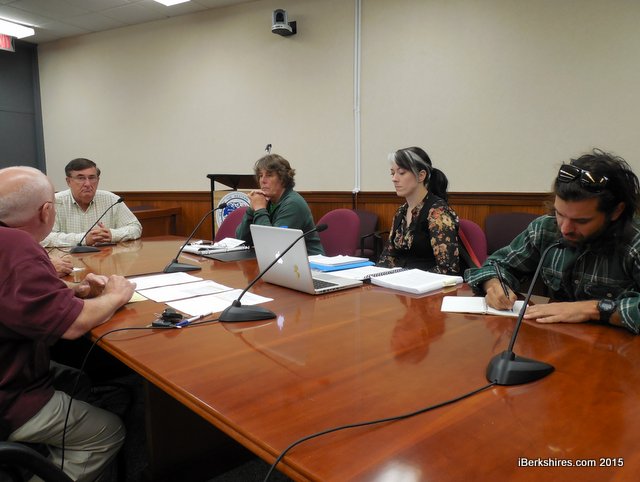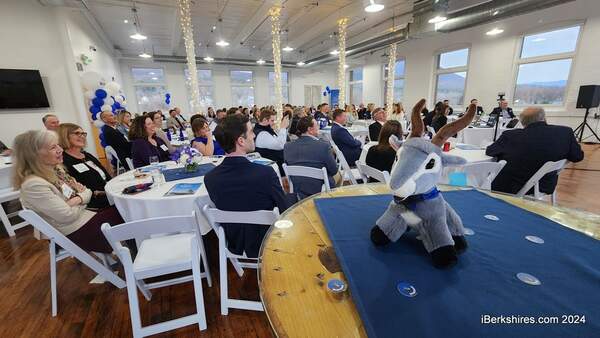Committee Approves Changes To North Adams Zoning Ordinances
|
City Councilor Wayne Wilkinson asked the North Adams General Government Committee to recommend some zoning ordinance changes to the City Council. |
NORTH ADAMS, Mass. — The General Government Committee voted Monday night to recommend to the City Council several changes to the city's zoning ordinances regarding homes, commercial structures and vacant lots that currently do not conform to regulations.
City Councilor Wayne Wilkinson originally brought three specific concerns to the City Council: the rebuilding of homes on nonconforming lots, the ability to receive permission for nonconforming commercial structures to continue business in a residential zone, and the mechanism for a landowner to gain permission to build on a nonconforming lot.
On Monday, Wilkinson told the General Government Committee that before zoning was enacted in North Adams, most housing lots were established with 50 feet of frontage because they were measured by archaic rods and chains methods.
In the 1970s, when North Adams implemented zoning, building lots were set at 7,200 square feet with 60-foot frontage. This meant landowners would need city permission to rebuild their homes to conform to the new regulations.
Building Inspector William Meranti said that prior to zoning, when the city was originally settled, homes were built close together. He said Bracewell Avenue, East Quincy Street, River Street and Hall Street were built this way, and these homes have been grandfathered in. This changes, however, when they are knocked down.
“The city was built out in a very tight manner, and everyone walked to work so they didn’t have cars and they didn’t need the space we have these days,” Meranti said. “A lot of our neighborhoods were built that way.”
The first aspect of the ordinance changes the committee approved would allow the repair or rebuilding of nonconforming structures after unforeseen catastrophic damage within 12 months to two years as long as it does not substantially change the character or size of the building.
Wilkinson said currently if a house is destroyed by fire or some other natural disaster, they need permission from the city to rebuild.
The two other issues “morphed” out of the original concern he bought to the council, Wilkinson said.
One is an amendment to the nonconforming zoning ordinance that would add language to allow any nonconforming commercial structure that has been abandoned or not used for two years to continue business in a residential area with special permitting.
“If you have a commercial building in a residential zone that hasn’t been used in two years, it all of a sudden becomes worthless because it no longer can be used commercially,” Wilkinson said.
He said the NAPA building and the West End Market fall under this category.
Wilkinson said the change gives the city some power to decide situations on a case-by-case basis, but any case still would have to go before the Zoning Board and then the Planning Board for a site plan review.
“It would be a two-step process, but what I like about it is each case is treated individually,” he said. “You have some input on what they can do.”
The other issue is a change that would allow landowners of vacant nonconforming lots to apply for permitting to build on the lot.
Wilkinson said many of these lots contained properties that were condemned by the city and knocked down. He said they have high liens on them due to demolition costs.
Because of this, there are many “holes” in neighborhoods where people can’t build. He said, however, this possible change has concerned some residents who use these spots in the neighborhood for parking or green space.
Meranti suggested adding language that would give the city some control over what is being built and the ability to consider whether development will damage the neighborhood.
“Not every lot is suitable for this and ... it should not be detrimental to the neighborhood. It has to be consistent with the neighborhood, and that it is a harmonious use of that lot in the neighborhood,” Meranti said.
He added anyone interested in building on these lots would come before the Zoning Board. He said this would also allow public input.
All changes will go to the city solicitor for drafting and to make sure they align with Massachusetts General Law. They will then go before the City Council.
Tags: commercial zoning, general government committee, ordinances, zoning,
















